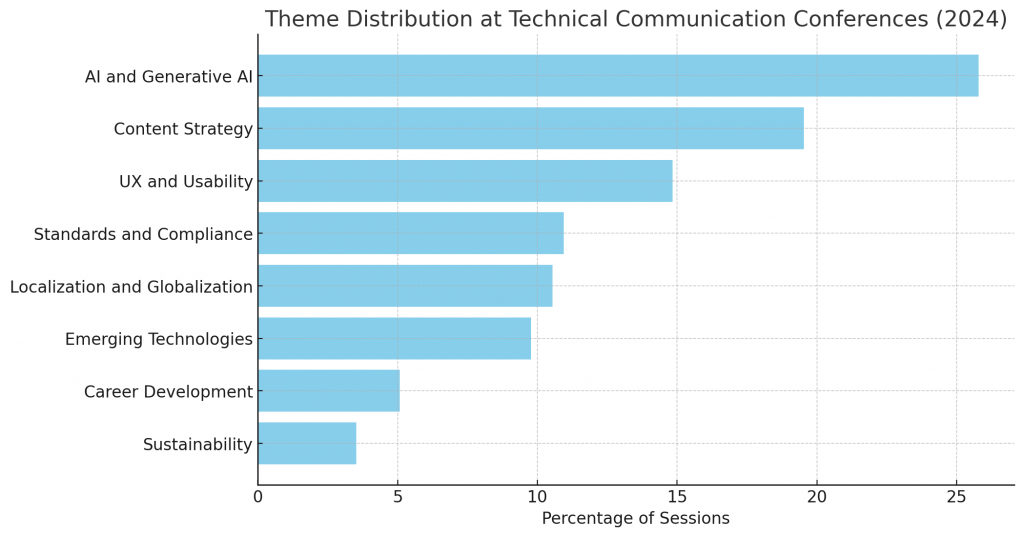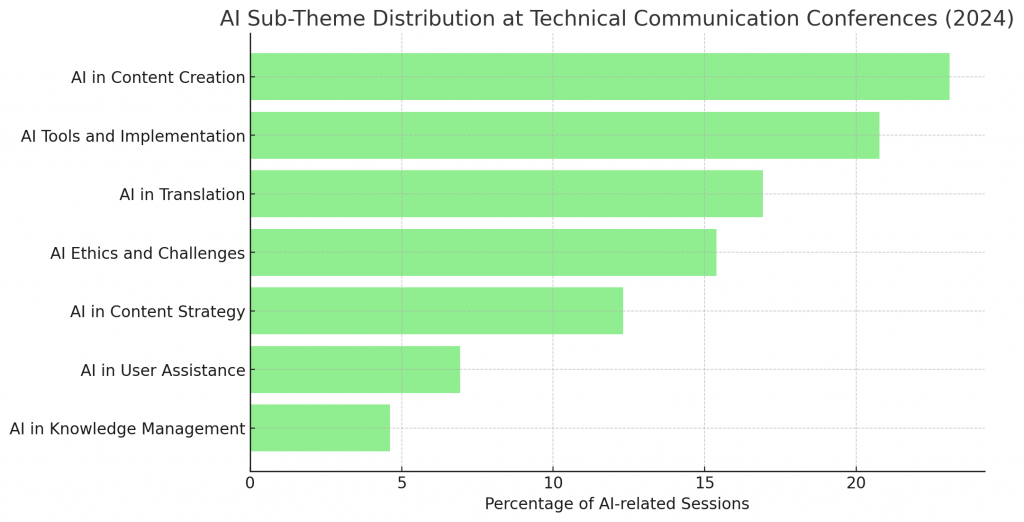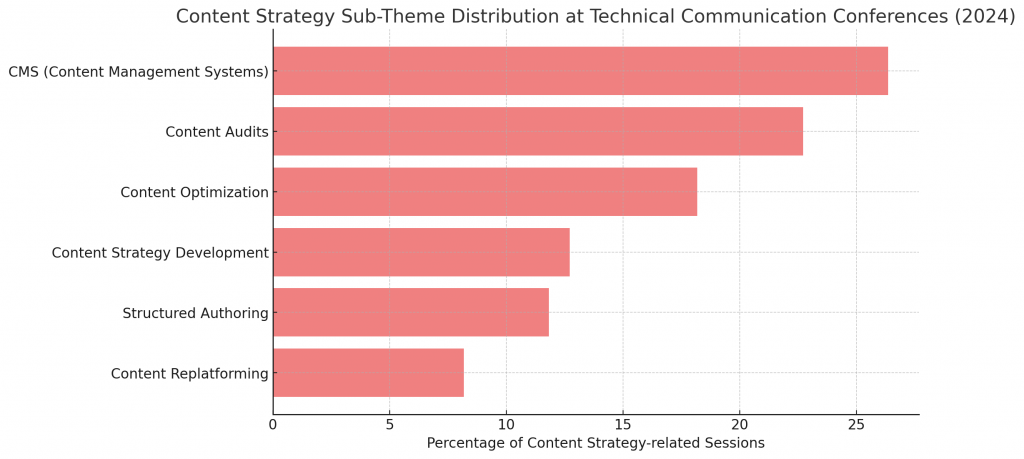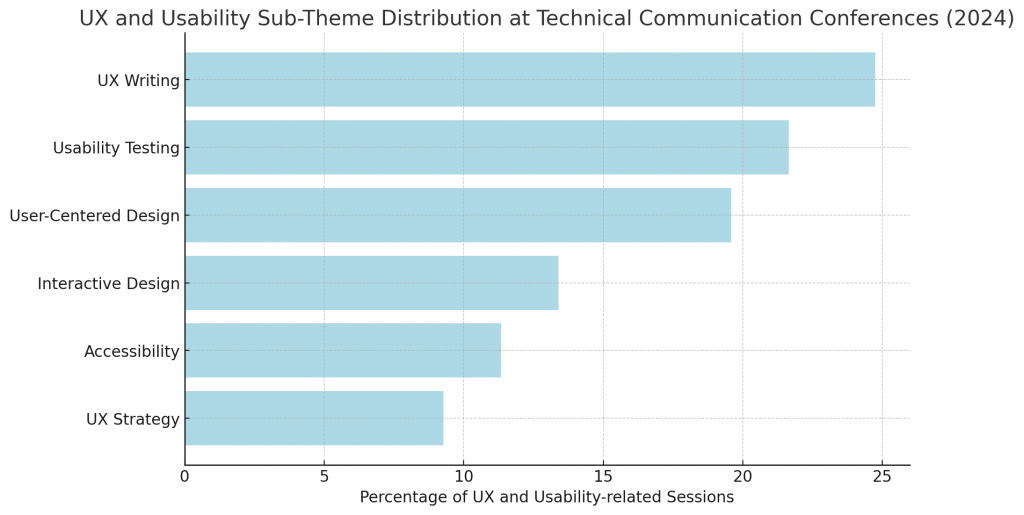In this episode of the Cherryleaf podcast, we explored the latest trends in technical communication as revealed by an in-depth analysis of conference themes from 2024.
By examining data from leading events such as Tekom, TC World, LavaCon, and the STC Summit, we identify eight major themes shaping the industry, with a surprising dominance of AI and generative technologies.
Listen in to understand how these trends are influencing content strategy, user experience, compliance, and more, and learn how to position yourself at the forefront of these developments in technical communication.
Transcript and graphs
Hello and welcome to the Cherryleaf podcast.
Normally we have a break during the summer for one month where we don’t publish an episode. But this year we’re planning to go through for the whole of the year and we came up with an idea for what you might call a quick and dirty podcast episode.
Normally towards the end of the year, we look at future trends in technical communication and we thought it might be useful to look at current trends: What trends have emerged during 2024 rather than look to what is happening in 2025 with both current trends and future trends. It’s important for technical communicators to keep in touch with the trends, to be aware of the skills that are needed today and will be needed in the future.
What we’ve done is we have analysed data from the most popular conferences that focus on technical communication to see if that can give us an understanding of the direction and skills that will be needed are needed in technical communication.
What we’ve done is we’ve analysed the topics within the technical communication conferences that have happened and will be happening in 2024. So we hope, by the end of this episode, you’ll have a clear picture of the direction of what’s driving our industry, our sector forward, so that you can position yourself to be at the front or in the middle, but certainly not behind of these trends and developments.
Let’s begin by telling you about the methodology. We got a list of the leading events that have happened and will be happening in 2024. Events like tekom TCWorld, LavaCon, ConVex Ideas, ConVEx, the STC Summit and Write The Docs. And then what we did was we asked Claude and ChatGTP to analyse the topics, and ask them to categorise and analyse the main themes from those conference topics.
Now there are some weaknesses to this approach. One is, have we picked a representative sample of the conferences that are out there, that technical communicators attend?
One of the challenges we faced was that for some conferences, when the conference is over, they take down the programme and they put up a “call for speakers” for the next year. So there were some conferences where the programme has been taken down. We didn’t have that information. In an ideal world, we would have maybe two or three more conferences that we could include.
With the exception of tekom TCWorld, all of the conferences are in English, and there are two very large conferences, the STC Summit and tekom. And there is a risk that because they’re so big, because they have so many presentations, that that might skew the results.
So with tekom, that’s based in Germany, there’s an emphasis or an interest in manufacturing and an interest in standards, which you see much less in other conferences. With the Write the Docs conference, there’s a focus on API documentation. So that potentially could skew the results as well.
Hopefully with the conferences that we’ve picked, those balance out and we ended up with a representative sample.
And another criticism is the data analysis. We have relied on AI systems like Claude and ChatGTP to analyse the data, primarily to save time. And we’re assuming that those platforms have analysed the data.
And our third assumption is that we’ve assumed that the topics represent the content in the presentations. ChatGPT identified eight major themes in the conference programmes, and then from those major themes, it provided a breakdown of sub-themes.
Artificial intelligence and generative AI
Within those the first major theme was Artificial intelligence and generative AI, and it was quite surprising how many presentations there were across the different conferences on that .
And within that major theme there were three common topics about AI: AI integration in technical communication.
Conferences such as Tekom TC World and STC were focusing, or are focusing, on how generative AI can be integrated into the processes that technical communicators use. There was a prevalence of sessions on AI driven-content management, AI prompt engineering, and getting the most out of large language models.
The second thing on AI was the challenges and opportunities, the ethical considerations of AI, AI and readiness and documentation, and how to overcome the challenges that AI presents to technical communicators.
The third sub-theme, as it were, were. Generative AI applications. Workshops on using generative AI for content creation, for translation, and automating tasks. So an emphasis on case studies and practical applications.
Content strategy and content operations
The second major theme that it identified was content strategy and content operations. So this was around content audits and optimisation. There were a number of sessions at different conferences that highlighted the importance of content audits, structured authoring, and optimising content. So users got a better end experience. And the efficiencies in how the technical publications teams worked.
And also under that major theme was content management systems and presentations and workshops on modernising content management system platforms. Challenges of moving from one system to another. And how to use a content management system to create and manage technical documentation.
User experience and usability
The third theme it identified was user experience and usability. And two categories within that, UX writing.
Technical communication conferences are increasingly focusing on UX writing, including usability testing, creating user friendly interfaces, and designing content that meets the specific needs of users.
Now, not all technical communicators, in our experience have the skills in doing UX writing or usability testing. So that was interesting for it to pick up on that.
The other one was visual communication. The role of visual elements in documentation, including the creation of effective video content and visual aids. I wouldn’t necessarily categorise that creating videos as user experience or usability. Perhaps that needs to be categorised by itself.
Standards and compliance
The fourth topic of them, and this is where there might be the skew or bias from the tekom conference, was standards and compliance. Within that industry, standards and regulations are focused on compliance with international standards such as ISO and ANSI, and how these impacts on the creation of technical documentation sessions on new regulations such as the AI Act, which is coming in in the EU, EU Product Safety regulations, and some other legal requirements.
And documentation for safety and compliance topics such as creating compliance, safety warnings and instructional materials.
Localization and globalisation
Then No. 5 was localization and globalisation. Within that translation management and cultural competence. So let me read from the response from ChapGPT:
With the growing global reach of businesses, sessions on managing translations, improving localization processes, and the impact of AI on translation quality are prominent.
And under cultural competence,
Discussions on cultural competence in technical communication are also emerging, reflecting the importance of understanding diverse audiences.
Emerging technologies
The sixth theme: emerging technologies. And within that knowledge, graphs and metadata. Again, I wouldn’t necessarily categorise the two together normally.
And ChatGPT said
The use of knowledge graphs in documentation and the role of metadata in creating intelligent information systems are new and growing areas of interest.
Now this is something that we have seen coming up. We saw from another podcast that might have been from a tweet about the challenges of structured content systems like DITA and AI is that AI systems have a method of vectorizing, or chunking information up, which essentially ignores the structure that has been formulated by platforms or standards like DITA. And one way in which you can help AI systems understand the hierarchy and importance and relationships of data is to use knowledge graphs. And in fact there are AI systems where you can ask it to create a knowledge graph for you.
So this might be associated with the growth and the importance of AI in getting the most from your source content. When you ask generative AI systems and platforms to provide answers, drawing on that infomation.
And the other area under emerging technologies: automation and process efficiency. Automation in technical documentation processes, including using tools for content delivery and metadata management.
Again, this might be related to AI and how can we use AI to automate some of our processes. Make technical writing more efficient. It might also be how do we manage the complexity of large documentation sets.
Career development and personal branding
The seventh theme that it identified was career development and personal branding.
And I have seen some topics on this professional development type topics at the STC conferences. And under that, it identified two categories. One was skills for the future. And it said conferences are emphasising the need for technical communicators to develop new skills, such as personal branding, presentation skills and late career transitions.
And the other thing was leadership and management. Workshops on managing editorial teams, effective communication within teams, and personal productivity, are also frequently seen at conferences.
Sustainability and ethical considerations
And the eighth major theme that it identified was sustainability and ethical considerations.
So sustainable documentation practises. It said a few sessions focused on creating sustainable documentation processes reflecting a broader trend towards environmental responsibility and under ethical use of AI and technology. The ethical implications of AI and new technologies and technical communications are becoming a discussion point, especially around topics like AI bias and data privacy.
Recap
So a significant focus on AI content strategy. UX, and compliance, plus emerging standards.
Quantifying the data
We also asked ChatGPT, if it could quantify the trends to back up and justify with numbers with data, the trends that it identified.
And the approach that ChatGPT did was it firstly identified and categorised set sessions by reviewing the session titles and descriptions and categorising them under those major themes. And then counting the amount of sessions in each of those themes, and then from that, calculating the percentage of sessions dedicated to each of those themes.
And the headline figures that it came up with was:

Under AI and generative AI, about 26% of the sessions focused on AI related topic, making it the most dominant theme across conferences. That really surprised me that AI was so dominant within the conferences.
For content strategy, it said 19.5% of the sessions were dedicated to content strategy.
Again quite a high figure for UX and usability. That was almost 15% of sessions.
10% were about standards of compliance.
10% were about localization and globalisation,
10% were about emerging technologies.
5% were about career development,
3.5% percent were on sustainability.
Now we rounded those numbers up, so if you did add them up, that would come to slightly more than 100.
What’s interesting is what’s missing.
There isn’t as a major theme, a topic about writing itself and ways to write. It’s much more about the processes, the ways we can write in better ways we can manage the content, we can deliver and publish the content in better ways. Although perhaps standards and compliance within that is information or trends about what we write.
I’m going to hit you with some more figures, so it might be worth you looking at the transcript that we’ll post to our websites.
We might also do an article on that because listening to numbers can be a bit overwhelming, but we did ask it to look at the major themes and break them down. Again, quantify the numbers.
AI sub-themes
So we talked about some major sub themes around AI.

And within the section or sub-theme of AI and content creation:
About 23% of the AI sessions or AI related sessions were focused on using AI for writing for content creation. How AI can assist in generating, managing and optimising content.
About 20% of the AI sessions were about tools and implementation. Practical aspects of implementing AI tools in your workflows. And there were hands on sessions and workshops about that.
About 16.9% of the sessions were about AI in translation, using it within that sphere. Around machine translation, quality control and localization, where those activities are supported by AI.
15% were about AI ethics, the ethical implications and challenges of using AI in technical writing.
12% were about exploring how AI can influence and enhance content strategy. Aligning AI capabilities with strategic goals for content development and management.
About 7% were about AI in user assistance. How can we create better Help systems, chatbots and user guides if we can incorporate AI into those.
And 4.5% were how can we apply AI to knowledge management? How can AI be used to organise, retrieve and use knowledge within organisations? So take the information we have today and repurpose it or extract from that useful information that might be otherwise lost or buried.
Content strategy and operations sub-themes
I’ll provide some statistics on the other major theme.
Around which was content strategy and operations.

So within that:
26% of the content strategy related sessions focused on content management systems, modernising, implementing and optimising CMS content management systems.
22% or almost 23% of the talks were around content audits, analysing structuring and improving existing content. Which perhaps reflects the importance of keeping the content we create up-to-date, accurate of high quality.
18% of the sessions were about content optimization. How can we take the content and make it a better user experience? What can we do with regards to SEO? And operational efficiency through improving content performance.
12% of the sessions in content strategy were on developing and aligning content strategies with the organisation goals. So can we create content that’s strategic to the organisation
And 8% on what’s it called content re-platforming. Moving from one content system to another.
And it also did some analysis. It said
the focus on CMS and content audits highlights the critical role these tools and processes play in managing and improving content.
Significant attention is also given to optimizing content and developing strategic approaches to content management, indicating a trend towards more data-driven and goal-oriented content practices.
And that would be something that would be worth analysing in detail.
Does this mean that content that technical writing is becoming more data-driven? I’m not sure if that’s true.
And the third analysis it said was
The emphasis on structured authoring shows a continued interest in standardizing content creation for better management and reuse.
Usability/UX sub-themes
Its analysis for usability/UX was that
The significant focus on UX writing and usability testing highlights the industry’s emphasis on creating content that is not only well-written but also tested for effectiveness.

Again, I don’t know how much testing is actually going on within technical publications teams. That’s hasn’t always been the case. It’s one of those things where people haven’t had the time to do it.
Another analysis topic it picked up on within UX was:
The attention to user-centered design and accessibility reflects a strong commitment to making technical communication more inclusive and user-focused.
The presence of interactive design sessions indicates a growing interest in creating dynamic and engaging user experiences.
That’s interesting. That would be worth delving into as well, whether we’re moving away from just knowledge bases and static pages and creating more engaging interactive content.
And the third element, it said within analysing the UX topics:
The sessions on UX strategy suggest that organizations are increasingly seeing the value of a strategic approach to user experience, ensuring that UX efforts are aligned with business goals.
Asking Google Gemini
We also asked Google Gemini to see if it could identify the same themes and it came up with pretty much a similar response to what ChatGTP said. That said, these are the common themes that it came across.
Artificial intelligence as a major theme with many conferences featuring talks on using AI in technical communication.
DocOps/ContentOps and Content as a Service. In other words, ContentOps is another emerging theme, which ChatGPT talked about in terms of content strategy.
Several conferences are featuring talks on using a strategic approach to technical writing, including applying engineering principles and improving SEO. There is also a focus on user experience with talks on designing a seamless in product. Help experience and using Google Analytics to measure customer experience with documentation.
Gemini also said while the provided conference agendas don’t reveal a dominant theme across all conferences, some interesting observations can be made.
AI in Technical Communication: This theme appears to be gaining traction, with mentions in conferences like Ideas in Information Management, Evolution of TC, and Lavacon.
And within that potential sub-themes AI.
- AI: The focus within this theme seems to be on understanding and applying AI in technical communication, with sessions on Unveiling AI, Applying AI, and Content as a Business Asset, AI.
- DocOps/ContentOps: This emerging theme revolves around integrating documentation processes with development operations, as evidenced by the “Devops Your Docs” session title.
- Strategic Technical Writing: This theme highlights the importance of a strategic approach to technical writing, encompassing sessions on applying engineering principles and crafting documentation for startups.
- User Experience (UX): The focus here seems to be on designing user-friendly documentation, with sessions on designing seamless in-product help experiences and leveraging customer experience data through Google Analytics.
And the other category of potential emerging themes which Gemini suggested are up and coming.
- Technical Writing Career Development: Sessions on “Leveling up your tech writing career” suggest a growing focus on professional development for technical communicators.
- Data-driven Documentation: The session on “Quantifying the impact of documentation” hints at an interest in measuring the effectiveness of technical documentation.
- Modern Documentation Techniques: Sessions on “Using graphics and videos in technical documentation”, “Using OpenAPI for API documentation”, and “Using dynamic, interactive elements in technical writing” point to a potential rise in the use of multimedia and interactive elements within technical documentation.
Again, I’m not sure if that is true. And Gemini qualified its analysis by saying this analysis is based on a limited data set and may not be exhaustive.
Summary
So what to make of all that?
There were themes that I expected would be in there. And then some surprises topics that I didn’t think would be there in, such prevalence of topics around use of experience and usability. I’m surprised that that’s so popular.
I’m surprised that AI has been so popular so quickly as a topic and things like using data-driven documentation using knowledge graphs, that’s a surprise.
It also shows the value of going to conferences. That in those programmes there are presentations on topics which are really interesting.
It’s a way of acquiring knowledge, gaining skills, and important topics. Topics there that I doubt you could have talked about certainly two years ago, probably not even a year ago, back in 2023.
Although you can think of technical communication as a profession where things move slowly, it is revealing quite how much change is going on, driven by technology.
We asked ChatGPT to generate some graphs of the data that it had. And what we’ll do is we’ll put up a blog post with those graphs summarising our findings from doing this this activity, as well as the transcript of this episode onto our blog.
So if you want to look at this another way, then go to our blog. Cherryleaf.com/blog and you’ll find some information on that after this podcast episode has been published. We welcome your thoughts. You can contact us by e-mail info@cherryleaf.com. Apart from that, thank you for listening until the next time. Bye bye.

Leave a Reply